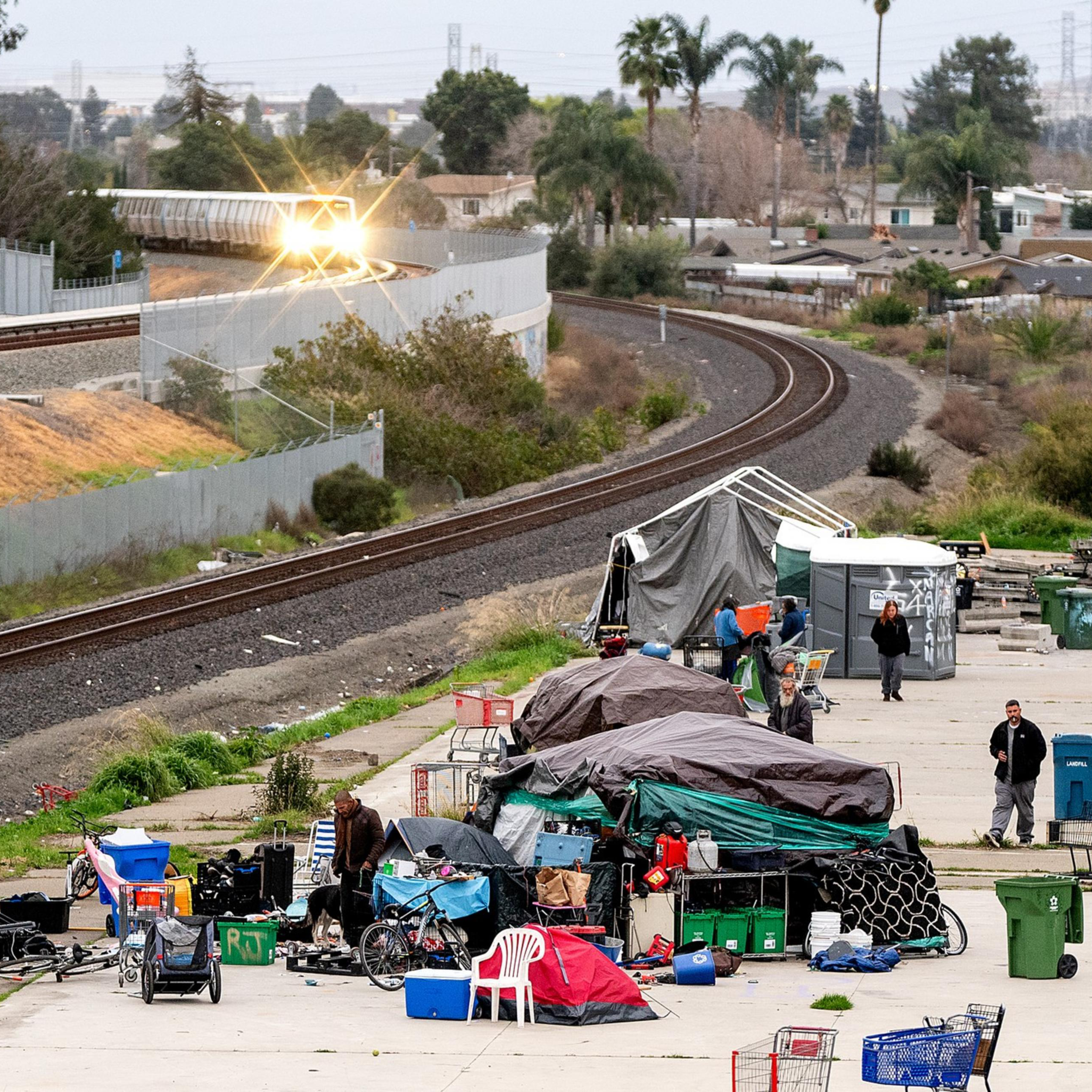The Fremont City Council on Tuesday passed a sweeping anti-homeless law, making encampments illegal citywide, but service providers fear that a vaguely worded clause will prohibit them from offering food, clothing, and other assistance to people living on the street.
The ordinance (opens in new tab) cites public health and safety concerns, noting that the city counted 223 encampments in 2022-23 and collected 409 tons of trash. There are 614 homeless people in Fremont, according to 2024’s point-in-time count.
The law criminalizes being outside with “camping paraphernalia (opens in new tab),” (opens in new tab) like sleeping bags or cookware, without written permission from property owners or the city. It includes a provision that anyone “causing, permitting, aiding, abetting or concealing” violations is subject to up to six months in jail and a $1,000 fine.

Police Chief Sean Washington suggested at the packed meeting that the law won’t be regularly enforced as most homeless people comply when asked to move on.
“This won’t be utilized randomly. We have to articulate the ‘why’ behind this. It’s not just someone sleeping on the street and camping; it has to be a concern impacting community well-being,” he said.
The law passed 6 to 1 after 73 people spoke during public comment, out of 205 who submitted cards to speak.
“Be the leaders of integrity we elected you to be,” 42-year-old nurse Bridget McShea said. “Align your intentions in tackling homelessness with a sustainable, multisector approach that focuses on housing first.”
Vice Mayor Desrie Campbell, the sole dissenting voice on the council, said she couldn’t support the ordinance as written, pointing to a lack of shelter beds.
“They’ve admitted the resources aren’t there,” she said. “Let’s fix what’s already broken instead of adding more.”
Local dentist Herb Chiu was in favor of the camping ban and attended the meeting. He told The Standard he often finds three homeless people sleeping outside his office and has to ask them to leave.
“We need to do something now,” the 69-year-old said.
Mayor Raj Salwan defended the ordinance, which takes effect in 30 days, saying it’s meant to keep public spaces accessible while helping those in need.
“This ordinance does NOT prevent organizations from providing food, water, or essential services to unhoused individuals,” Salwan said in an email Tuesday before the meeting.

But nonprofits and service providers say the law’s language contradicts the mayor’s assurances and would effectively criminalize their efforts to hand out food and clothing to homeless people.
“[The mayor] claims no service providers will get arrested, but ultimately, the law prevails,” said Vivian Han, CEO of the nonprofit Abode Services. “This is for all time, not just while he’s mayor.”
Greg Ward, a minister at Mission Peak Unitarian Universalist Congregation, said his church hands out “blessing bags” of food and clothing.
“Putting [them] in the hands of the unhoused could be aiding and abetting,” said Ward. “That could make us criminals.”
Fremont’s ordinance follows June’s Supreme Court Grants Pass decision allowing cities to force homeless people to move without offering shelter. The following month, former San Francisco Mayor London Breed began “very aggressive” homeless camp sweeps without notice.

Rob Vye, 44, who lives at one of Fremont’s homeless encampments, expressed concern about the camping ban when he spoke to The Standard hours before the meeting.
“If they pass it, I guess I’ll be a misdemeanor criminal,” Vye said. “Where do they want me to go, the sidewalk?”
The law marks a shift from the city’s current approach to “the slabs,” an encampment under the Osgood Road and Washington Boulevard overpass, where Vye lives with about a dozen others.
He said the city maintains portable toilets and provides trash collection services, though it sometimes confiscates property.

“Even when the police come out here, these guys have respect; they’re pretty nice,” he said.
Vye, who has sought shelter placement and housing assistance through Abode for six months, suggested that the city focus on affordable housing solutions instead of criminalization.
“People gotta realize we’re people. We’re not all criminals, drug addicts. We’re just trying to get by,” said Vye. “I tried getting into the shelters; they’re all full. This is the only place to go.”
Sixteen organizations, including the American Civil Liberties Union, said in a joint letter that the ordinance effectively criminalizes providing homeless services and violates Fourth Amendment protections against property seizures.
“It’s making poverty a crime,” said David Bonaccorsi, president of the advocacy group Fremont for Everyone. “It makes the homeless a criminal class.”

